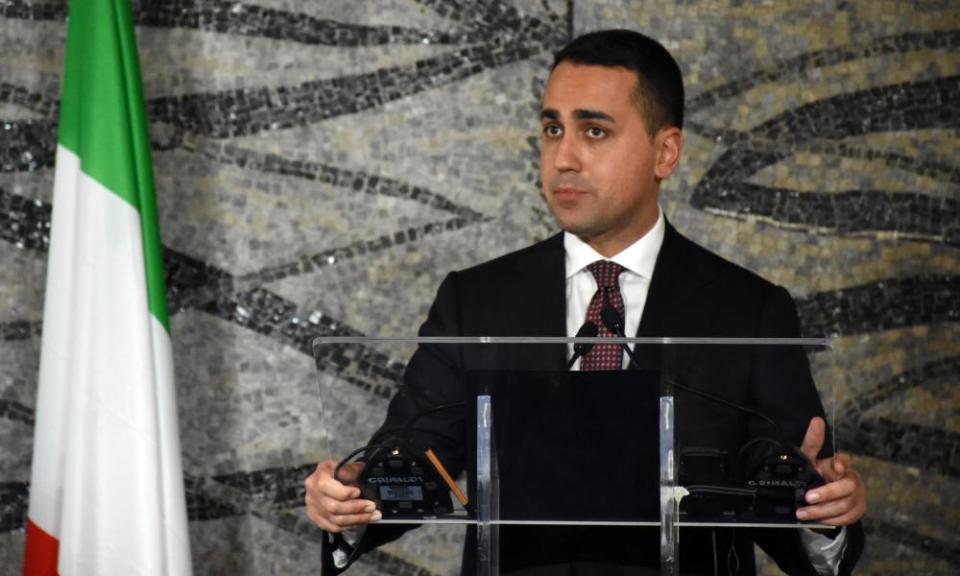Italy says decision to block 250,000 doses of Covid vaccine from Australia was 'not a hostile act'

Italian officials say the decision to block a shipment of 250,000 doses of AstraZeneca’s coronavirus vaccine destined for Australia was “not a hostile act”.
The comments came as Victoria recorded another day of zero local transmission of Covid-19 and one new case in a returned traveller in hotel quarantine on Saturday. New South Wales and Queensland also recorded zero cases of community transmission and there were three new cases in hotel quarantine in each of those states.
The Italian foreign affairs minister, Luigi Di Maio, addressed the blocking of the shipment while speaking at at a news conference after a meeting with his French counterpart, Jean-Yves Le Drian.
“All of Europe is now ravaged by the British variant and by the concern for the increase in infections,” he said. “In coordination with the European institutions, we have decided not to allow the export of these 250,000 doses.
“It is not a hostile act towards Australia. We have only applied an EU regulation approved on January 30th.”
Related: Coalition to expand quarantine facility amid fears of Covid vaccine disruption
The Italian government rejected AstraZeneca’s request to export doses to Australia on the grounds that the Anglo-Swedish company was failing to fulfil its promises on deliveries to the EU.
The EU has been engaged in a high-profile row with AstraZeneca since it informed officials of a shortfall in deliveries this quarter owing to a production problem at one of its EU sites. The company has said it can supply only about 40 million doses by the end of this month compared with the 90 million foreseen in its contract.
A mechanism under which vaccine suppliers would need to gain authorisation for exports out of the EU was drawn up in January amid concerns that doses made in the bloc were being delivered to the UK.
Di Maio said coronavirus vaccination campaigns needed to be sped up across the European Union.
The Australian health minister, Greg Hunt, said on Friday that Italy’s move did not affect the pace of the coronavirus vaccine rollout, because that shipment “had not been factored in to our distribution to the states and territories”.
He said the Australian government had “raised the issue with the European Commission through multiple channels, and in particular, we have asked the European Commission to review this decision”.
He sought to allay fears about the impact of Italy’s decision, describing it as “one particular shipment from one particular country” and noting the first shipment of 300,000 AstraZeneca doses arrived in Australia earlier this week.
The first AstraZeneca doses were administered in Murray Bridge in regional South Australia on Friday and the first domestically produced AstraZeneca doses are due to be released in the week starting 22 March.
Australia’s trade minister, Dan Tehan, brought up the decision with his European commission counterpart, Valdis Dombrovskis, on Friday.
A commission spokesperson said the Australian government had been given an explanation.
“Progress needs to be made on the deliveries to EU countries,” a commission spokesperson said.
Jens Spahn, the German health minister, has expressed caution over the long-term impact on global vaccine supplies after Italy’s move to reject the onward movement of doses, with the European Commission’s backing.
“With a measure like that, in the short term there’s a win, but we have to be careful that it doesn’t cause us problems in the medium term by disrupting the supply chains for vaccines and everything that’s needed in terms of precursors,” Spahn said.
On Friday, France’s health minister, Olivier Véran, said his government could follow suit, given the shortage of doses in Europe. But the move by Rome has alarmed those concerned that the EU is moving towards a protectionist approach to vaccine supply.
In Italy, there were nearly 25,000 new cases recorded overnight and about 300 deaths.

 Yahoo Finance
Yahoo Finance 